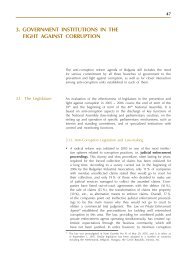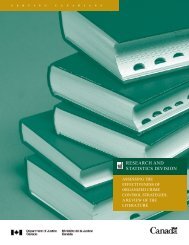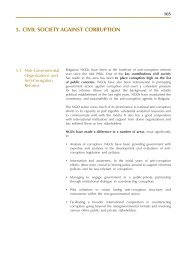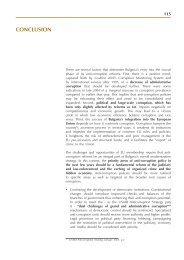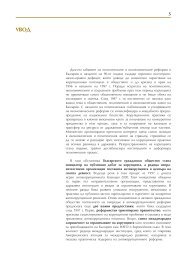National Threat Assessment 2008. Organised Crime - Politie
National Threat Assessment 2008. Organised Crime - Politie
National Threat Assessment 2008. Organised Crime - Politie
Create successful ePaper yourself
Turn your PDF publications into a flip-book with our unique Google optimized e-Paper software.
The dividing line between bona fide and mala fide companies is often thin.<br />
The companies involved may include companies that rent out ware houses<br />
(to store cars while they ‘cool down’), shipping compa nies that export cars and<br />
tyre companies (for ‘stashing’ cars in containers). We suspect that car thieves<br />
infiltrate the car-repair sector, as cars are sometimes stolen shortly after they<br />
have been to a garage for servicing.<br />
WODC research showed that two thirds of the criminal groups involved in car<br />
theft were internationally oriented, whereby countries in North and West Africa<br />
were the most frequent sales markets. West Africans (Ghanaians and Nigerians)<br />
play an important role. The stolen vehicles are shipped to Africa via the Dutch<br />
ports and via Antwerp. The West Africans play the role of intermediary between<br />
demand (customers and handlers of stolen goods) and supply (former<br />
Yugoslavian thieves). There were also investigations in which North Africa was<br />
the destination of the stolen cars; in those cases the police were dealing with<br />
Moroccan offenders and offender groups. A regional investigation identified a<br />
criminal organisation that traded in luxury cars obtained in Italy by fraudulent<br />
means. The cars were transported by road to the Netherlands, where they were<br />
loaded into containers for shipping to Morocco via Vlissingen or Rotterdam. All<br />
of the aforementioned function groups turned up in this investigation.<br />
In the past the involvement of Central and Eastern Europeans was established<br />
in cases where whole cars or car parts were exported to Eastern Europe.<br />
According to information from the <strong>National</strong> Vehicle <strong>Crime</strong> Information Centre<br />
(LIV), criminals from Estonia, Lithuania, Poland and the former Yugoslavia are<br />
mainly involved in stripping cars, i.e. the cars are stolen for parts. Research by<br />
the <strong>National</strong> Criminal Intelligence Department (DNRI) showed that criminals from<br />
Eastern Europe and the Balkans are involved in car theft aided by burglary.<br />
Apparently these offenders are not only involved in breaking into the home of<br />
the owner and stealing the car, but also in the handling of stolen cars and the<br />
export to other countries.<br />
According to car theft experts, the involvement of Dutch criminals in organised<br />
car theft should not be underestimated. The groups in question are apparently<br />
involved in stripping and ringing cars. Information from LIV shows that these<br />
groups include criminals from a caravan camp background, originating especially<br />
from the border region between the Netherlands and Germany. The activities<br />
of criminal caravan camp residents in terms of ringing stolen cars are well<br />
known, but according to experts they are also involved in the export. This<br />
suggests that offender groups that were originally more nationally oriented<br />
are starting to operate at the international level.<br />
chapter 4 – Supraregional property crime<br />
163



